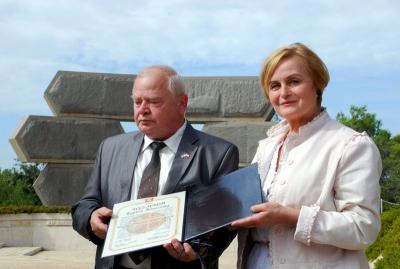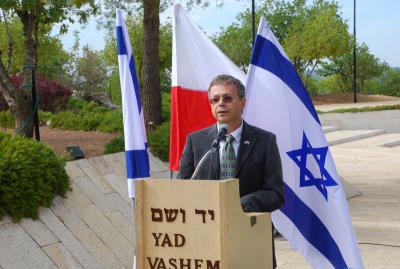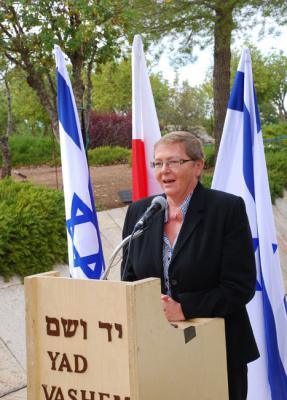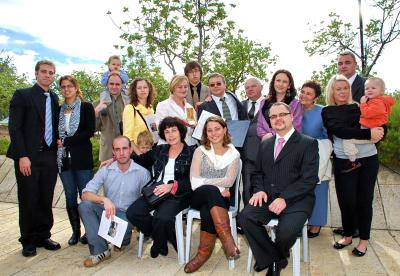
Mr. Jan Kmita and Ms. Ewa Nowakowska with the Righteous Among the Nations certificate in honor of their grandparents, the late Krolina and Mikolaj Kmita

Dr. Moshe Bronstein, son of the late Sophia Sarah Bronstein née Gwirtzman, Holocaust survivor, delivering his address at the ceremony
04 November 2009
On Wednesday, 4 November 2009, a ceremony was held at Yad Vashem honoring the late Krolina and Mikolaj Kmita of Poland, Righteous Among the Nations. Participants in the ceremony included the Kmita’s grandchildren, Mr. Jan Kmita and Ms. Ewa Nowakowska, and other family members who came especially from Poland for the event, H.E Mrs. Agnieszka Magdziak Miszewska, Polish Ambassador to Israel, Dr. Moshe Bronstein, son of the late Sophia Bronstein née Gwirtzman, Holocaust survivor, family and friends, Holocaust survivors and members of the Commission for the Designation of the Righteous Among the Nations. Also present were educators from Poland taking parting a seminar run by the International School for Holocaust Studies in cooperation with the Auschwitz Museum.
Krolina and Mikolaj Kmita were recognized as Righteous Among the Nations in 1967, and in 1972, survivor Sophia Bronstein planted a tree in their honor at Yad Vashem, but for various reasons, the award ceremony could not be held until now. 45 years later, Dr. Bronstein brought the Kmita family to Israel for the ceremony.
After a memorial ceremony in the Hall of Remembrance, the Righteous Among the Nations medal and certificate of honor were awarded to the Kmita’s grandchildren, Mr. Jan Kmita and Ms. Ewa Nowakowska, next to the tree planted by the late Sophia Bronstein in 1972 in honor of her rescuers, Krolina and Mikolaj Kmita.
The Rescue Story
On the eve of World War II, some 13,000 Jews lived in the city of Kowel, Poland (today Ukraine). In June 1941, the Germans occupied Kowel, and mass persecution ensued. Jewish businesses were nationalized and sanctions imposed, and Jews were captured and murdered. Several weeks later, the Germans collected the Torah scrolls from all the synagogues in the city, and burned them. By the end of 1941, approximately 1,000 Kowel Jews had been murdered.
Towards the end of May 1942, two ghettos were established. In one ghetto, all the “useless” Jews – those who could not be exploited for forced labor - were incarcerated. They were murdered one month later, in June 1942. Liquidation of the second ghetto started in August 1942. Many tried to escape and hide, and hundreds of Jews were caught and forced inside the Great Synagogue of Kowel. There, before they were slaughtered and buried in pits that they were forced to dig themselves, they scratched their names and last testaments on the walls of the synagogue. These Jews were murdered over a period of two months.
In October 1942, the last Jews of Kowel were eliminated. Only a few survived, having managed to flee to the surrounding forests. Sophia Sarah Bronstein, then 21, was amongst the survivors. After the first Aktion in the ghetto, Sophia fled to her apartment on Monopoliova Street, where she met her neighbor Elsa Kmitova. Elsa gave Sophia documents, and sent her with her mother-in-law Krolina Kmita and her husband Mikolaj to their farm in the adjacent village of Boza Drobka. The Kmitas covered Sophia’s eye, as though she were ill, and took her to their home in a cart, presenting her as a relative.
On 2 September 1942, while the first Aktion against the Jews was taking place in the nearby town of Holuby, the Kmitas dug a pit in their courtyard, and hid Sophia and four other Jews there.
“Grandma” Krolina brought them food, water and clothes each day. After two weeks, the other four Jews left, and Sophia was left by herself. During the day, she would go up to the house, returning to the pit every night. In November 1942, the persecutions worsened, and the Germans ordered all the remaining Jews in the area to come to Holuby. Krolina refused to give Sophia up, and would not let her go, despite her family’s demands to evict the Jewess. For eight months, Krolina hid Sophia in the pit that she had dug in the adjoining field, covering her with straw, and at night, in the cold and snow, she would come to visit her, bringing food and warm clothing. After 8 months, Sophia returned to the pit on the farm, until a young woman who helped with the housework discovered her hiding place, at which point, Krolina hurriedly moved Sophia to the attic. Sophia hid in the Kmita’s house until the liberation in March 1944.
In the course of the war, the Kmita’s home was open to all those seeking refuge, and other Jews hid there for various lengths of time. Krolina also brought food and clothing to Jews hiding in the forests. The couple acted altruistically and courageously, at great personal risk, out of love for their fellow human beings.
Krolina and Mikolaj Kmita were recognized as Righteous Among the Nations on 1 January 1967, and a tree was planted at Yad Vashem in their honor in 1972.








